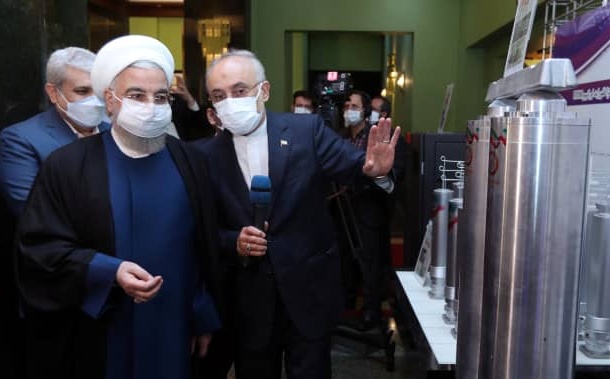Iran President Hassan Rouhani and head of the Atomic Energy Organization Ali Akbar Salehi at an exhibition on National Nuclear Technology Day, Tehran, April 10, 2021
UPDATE, 0610 GMT:
The Biden Administration is continuing its cautious response to the Natanz explosion.
White House spokesman Jen Psaki repeated the statement of a “senior Administration official” earlier on Monday, “The US was not involved in any manner. We have nothing to add on speculation about the causes or the impacts.”
Defense Secretary Lloyd Austin, who was in Israel on Sunday and Monday, did not say “Iran” once during his two press briefings.
Administration officials, speaking off the record, expressed concern that the explosion will push Iran into moving more of its nuclear program underground.
ORIGINAL ENTRY: After Sunday’s sabotage of the Natanz nuclear complex — likely by Israel — Iran has toughened its line with a series of steps and statements over the 2015 nuclear deal.
Foreign Minister Mohammad Javad Zarif led the way by extending Tehran’s demands over the removal of US sanctions, before any advance in discussions for American re-entry to the deal.
In a letter to UN Secretary General António Guterres, Zarif extended the demands to lifting of “all sanctions imposed, re-imposed, or relabeled since the adoption of the JCPOA [Joint Comprehensive Plan of Action]” in July 2015 with the 5+1 Powers (US, UK, France, Germany, China, and Russia).
In January, Zarif had set Iran’s position as the removal of all Trump-era sanctions, including comprehensive measures against the oil and financial sectors in November 2018, six months after US withdrawal from the deal.
The Foreign Minister’s letter also blamed Israel for “nuclear terrorism” in an attempt to block indirect nuclear talks which opened last week in Vienna. The discussions, with the other 5+1 Powers and the European Union moving between Iran and the US, are due to resume on Wednesday.
Thread:
1/3
I wrote to UNSG:Deliberate targeting of a safeguarded nuclear facility—w/ high risk of indiscriminate release of radioactive material—is nuclear terrorism & a war crime
Israel threatened and now boasts about action to prevent restoration of JCPOA after US election. pic.twitter.com/gMstxI4DfD
— Javad Zarif (@JZarif) April 12, 2021
Zarif warned that Iran’s suspensions of the deal’s provisions will “now take a significant upward leap following this latest terrorist sabotage”.
Responding to US sanctions, the Rouhani Government began suspending compliance with terms from summer 2019. The process has accelerated this year with the installation and operation of advanced centrifuges and a return to the pre-2015 enrichment of 20% uranium, which potentially can be further enhanced to a military weapons grade of 90%.
Last summer’s deliberate explosion inside a Natanz building targeted centrifuges. Sunday’s blast appeared to cause more extensive damage, although Iran claims only older IR-1 centrifuges were destroyed or damaged.
The 2015 deal limits Iran to the IR-1 model, but Tehran now has several cascades of advanced versions. On Saturday, President Hassan Rouhani presided over a ceremony installing uranium gas into 164 IR-6 centrifuges and 30 IR-5 centrifuges, and launching mechanical tests on IR-9 machines.
See also Israel Points to Attack Blacking Out Iran Nuclear Facility
Iran Launches More Advanced Nuclear Centrifuges
Speaking from hospital after he was seriously injured in a fall while inspecting the Natanz damage, Atomic Energy Organization spokesman Behrous Kamalvandi insisted that Iran can “compensate” for losses within a month to six weeks.
US and Israeli officials have said the explosion set back Iran’s uranium production by nine months. Iranian counterparts, including atomic energy head Ali Akbar Salehi, declared that new advanced centrifuges will soon replace the affected IR-1s.
But Iranian officials appeared to confirm the claim of an Israeli intelligence official that an explosive, detonated remotely after it was smuggled into Natanz, knocked out both the primary and backup electrical systems.
Fereydoun Abbasi, the head of Parliament’s Energy Committee, said, “The enemy’s plot was very beautiful….They thought about this and used their experts and planned the explosion so both the central power and the emergency power cable would be damaged.”
Warnings Over Inspections and EU
Iran also threatened on Monday to further restrict International Atomic Energy Agency inspections.
#Iran IAEA envoy:Process of replacing damaged IR1 machines with ones 50% more capable in enriching began & new machines will be installed in Natanz. Besides, in response to the sabotage, other important technical measures been planned & @IAEAOrg will be notified on them this week
— Abas Aslani (@AbasAslani) April 12, 2021
In February, the Rouhani Government withdrew from the Additional Protocol to the Nuclear Non-Proliferation Treaty. The step limited IAEA “snap” inspections. Iran is withholding all videotapes of the IAEA’s monitoring of nuclear sites.
Foreign Ministry spokesman Saeed Khatibzadeh declared yesterday that Iran is considering counter-sanctions against the European Union and suspending contacts with the bloc.
Khatibzadeh said he was responding to new EU sanctions, including travel bans and asset freezes, on eight Iranian officials including Revolutionary Guards commander Maj. Gen. Hossein Salami.

